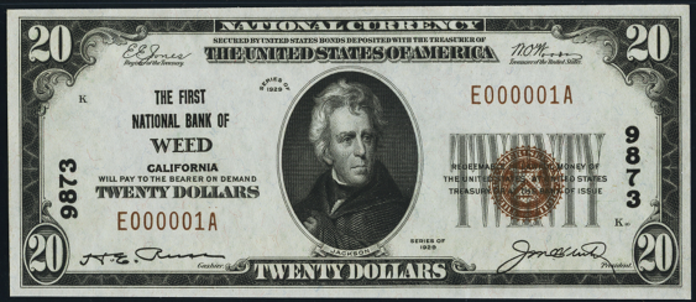Twenty Dollar Notes › Nationals › 1929 Twenty Dollar National Bank Notes › West Virginia Charters › 1929 $20 Ripley West Virginia First National Bank
Get Value Now
| Item | Info |
|---|---|
| Series | 1929 |
| Charter | #10762 First National Bank of Ripley, West Virginia |
| Year Chartered | 1915, 138 Banks Chartered |
| City Info | Ripley is a city in and the county seat of Jackson County, West Virginia, United States. The population was 3,252 at the 2010 census. Ripley was originally owned and settled by William, John, and Lewis Rodgers. They received a grant of 400 acres in 1768 where "Sycamore Creek joins Big Mill Creek". The land was later sold to Jacob Starcher, most probably in 1803. Jacob Starcher erected a grist mill in 1824 and laid out the town in 1830, naming it in honor of Harry Ripley, a young minister who was to be married, but drowned in Big Mill Creek, about one and a half miles north of the town, shortly before the ceremony took place. Source: Wikipedia |
| Similar Cities | If your note doesn't match try: 1. Ripley, Ohio - First National Bank 2. Ripley, Ohio - Farmers' National Bank 3. Ripley, Ohio - Ripley National Bank 4. Ripley, Ohio - Citizens' National Bank 5. Ripley, New York - First National Bank 6. Ripley, Mississippi - First National Bank 7. Ripley, Tennessee - First National Bank |
| Seal Varieties | Small Brown |
| See Also | If your note doesn't match try: 1. 1929 $20 Federal Reserve Bank Note 2. 1928 $20 Federal Reserve Note 3. 1928A $20 Federal Reserve Note 4. 1928B $20 Federal Reserve Note 5. 1928C $20 Federal Reserve Note 6. 1934 $20 Federal Reserve Note |
| Other Info | 1. Value depends on notes known for charter, condition and market demand. |
| Neat Fact | Check your note's serial number. Serial #1 notes are valuable, even on common charters. Serial numbers 2-4 are also desirable in some cases. |
No Obligations Offers and Appraisals
Please submit a good photo or scan. It will be identified and evaluated. Understand there may be subtle differences between the image you see above and your note. Signatures, design, markings and note condition will determine the offer price. Notes in Uncirculated or better condition receive the best offers.
Appraisals can be estimated for wholesale and retail prices. Wholesale is what dealers typically pay. Retail is what a collector might pay. Retail is slightly higher in most cases.
Please visit this page for USA Paper Money Reference. Do not treat this page as a reference guide, it is for appraisal and acquisition purposes only.
